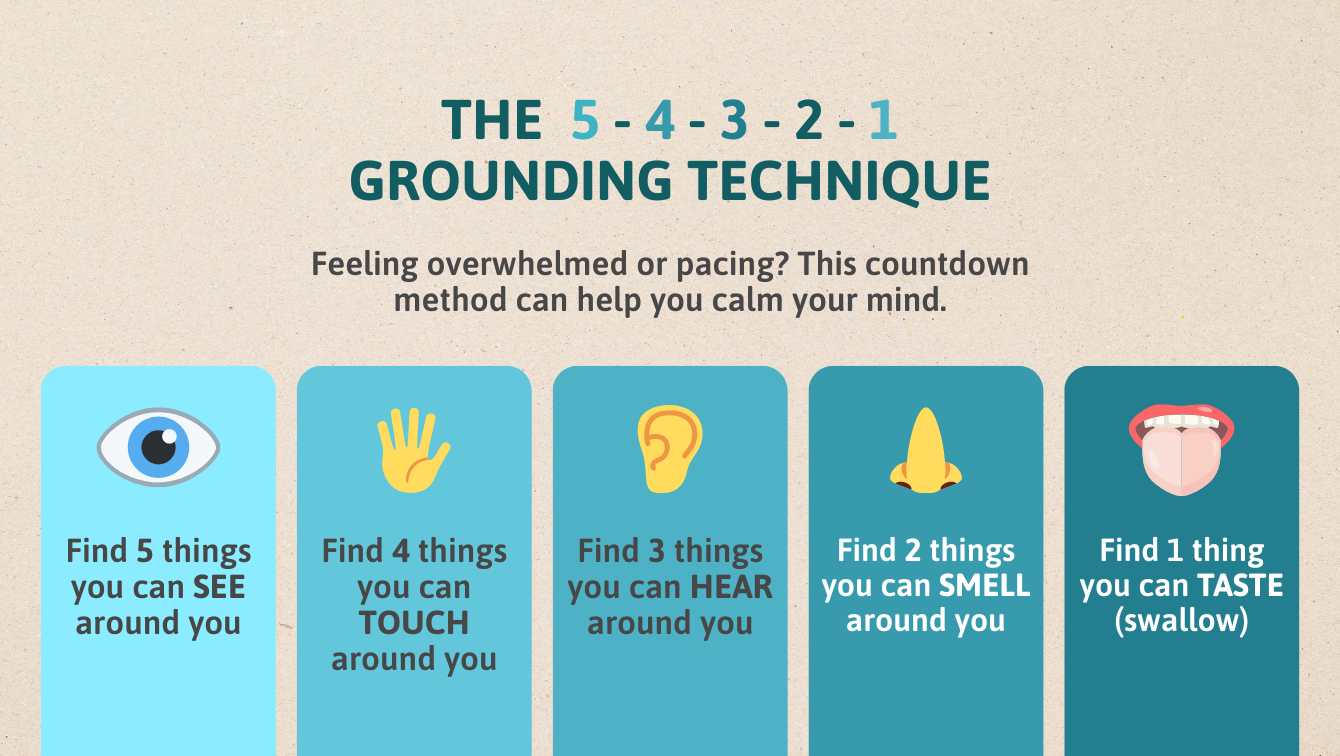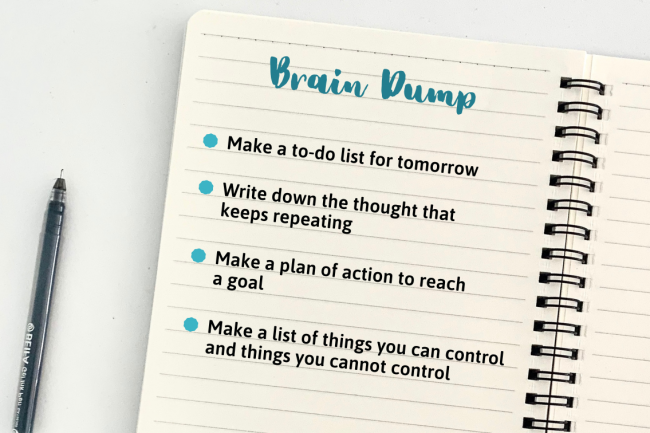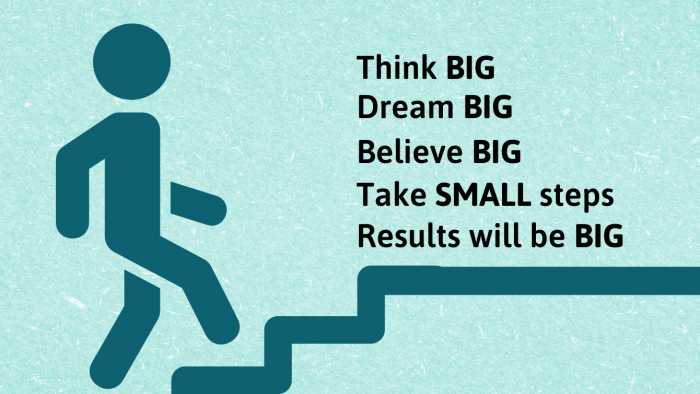Have you ever gotten stuck in your head, repeating the same negative thoughts over and over again? If so, you know how hard it is to stop ruminating, which is when you repeatedly think or worry about something upsetting.[1]
Rumination is a bad habit that’s known to worsen stress, anxiety, and depression. It can also affect your social interactions, self-esteem, and overall quality of life, which is why it’s so important to learn how to stop negative thought loops.[1][2][3]
This article will help you understand what rumination is, how it affects you, and ways to stop negative self-talk before it takes over.
Sections
- What is rumination?
- Why is it important to stop ruminating?
- How to stop ruminating: 10 tips
- Common questions
What is rumination?
Rumination is a tendency to repeatedly think, obsess or worry about certain negative thoughts.[1][3] Overthinking things that are upsetting, replaying the blooper reel of socially awkward moments, or overthinking interactions that haven’t happened yet are all examples of rumination. Some people struggle to stop ruminating on the past, while others find it harder to avoid worrying about the future.

No matter what types of thoughts, stories, or topics people get stuck in, most people who ruminate:[1][3][4]
- Feel like they can’t stop thinking about something negative or upsetting
- Experience more stress, anxiety, and negative emotions as a result of their thoughts
- Notice negative thoughts and feelings feed into each other, which becomes a cycle
- Find that rumination makes it hard to be present in their lives and experiences
Why is it important to stop ruminating?
While everyone sometimes ruminates on negative thoughts, doing it too often increases the risk of a number of different physical, social, and psychological problems. For example, researchers have found that people who ruminate on negative thoughts:[1][2][3][5]
- Are more likely to report anxiety, depression, and mental illnesses
- Are more stressed out and feel stressed for longer periods of time
- Have more intense and longer-lasting negative moods and emotions
- Have lower levels of self-esteem and confidence
- Are more impulsive and likely to binge drink, binge eat, or self-harm
- Make less/slower progress when they seek out therapy
- Have a lower overall quality of life and poorer relationships
- Are more likely to struggle with social anxiety
- Have a harder time getting to sleep or staying asleep at night
How to stop ruminating: 10 tips
Most people who ruminate don’t know how to stop thinking about something that’s upsetting them, but it’s possible to learn how to stop obsessive thoughts. It just takes a certain set of skills, along with a lot of time, patience and practice. Below are 10 of our top tips for people trying to stop ruminating, worrying, and overthinking.
1. Zoom out and observe your thoughts
Have you ever stepped back to simply listen and observe your negative thoughts, or do you tend to jump into them headfirst? One simple and powerful way to begin feeling more in control of your thoughts is to zoom out, which allows you to observe them instead of participating in them.
If you’re not sure how to zoom out and observe your thoughts, try one or more of these techniques to help:
- Notice thoughts: Periodically, take time to check in and see what’s on your mind to become more aware of thoughts (not just when you’re ruminating).
Example: Set an alarm or reminder on your phone or try keeping a thought log.
- Name your thoughts: Consider giving a name to certain types of thoughts or OCD loops that come up the most as a way to distance yourself from them.
Example: “That’s my ‘I’m not good enough’ story” or “There’s my inner critic again.”
- Visualize thoughts: Another strategy you can try is to use some kind of image or visualization to help you observe your thoughts coming and going.
Example: Visualize thoughts as clouds above or billboards you pass by on the highway.
2. Use your 5 senses to become more present
When you’re stuck in your head, you’re not really present in your life. That’s why working to become more present is one of the best and most proven ways to break a rumination cycle.[1] There are many ways to do this, including practicing mindfulness or meditation, but grounding is an easy and fast way to get out of your head. Your 5 senses will always lead you to the real version of reality instead of the one unfolding in your mind.

To use this skill, choose one of your 5 senses to focus on. It’s a good idea to choose a sense that’s particularly strong for you (try a few if you’re not sure) because this will be the fastest way to come back to the moment. For example, visual people may want to focus on something colorful or bright, foodies might chew an altoid, and tactile people might have a fidget toy on hand.
3. Single-task to get more done
Most people have heard of multi-tasking, which involves juggling many different tasks at once. Single-tasking is the opposite and can be accomplished by putting your full undivided attention into whatever task you’re doing. When you’re fully focused on a task, you don’t have the mental bandwidth to ruminate, which is why this technique can help stop the cycle of overthinking.
There are a lot of other benefits to single-tasking, including being able to get more done and doing all your tasks well. You can single-task almost any task by just focusing (and refocusing) your attention back onto a task. Each time your mind wanders, simply bring it back to what you’re doing.
4. Use a journal to do a nighttime brain dump
If your mind starts racing the moment your head touches your pillow, you’re definitely not alone. Intrusive thoughts often creep in during quiet moments like these and can keep you from getting a good night’s sleep. If this happens to you, consider doing a brain dump before bed. Writing down thoughts, making a to-do list, or even coming up with an action plan can all help break you free from rumination patterns.[6]

For this exercise, you’ll just need a pen and paper (or a journal, if you prefer) where you can literally dump all of your thoughts onto the page. Whether it’s a problem you need to solve, a cringeworthy mistake you made at work, or a worst-case scenario thought, just dump and leave it on the page. That way, you can soothe your anxious mind by saying to yourself, ‘It’s OK, I wrote it down, and we’ll deal with it tomorrow.”
5. Defuse hot thoughts by reframing them
Reframing is a skill borrowed from Cognitive Behavioral Therapy (CBT) and can be a great way to deal with your emotions, mainly those about a particularly upsetting thought. Because strong emotions often act like fuel for intrusive thoughts, reframing can help defuse them. This way, it’s easier for you to just let them pass rather than getting stuck obsessing over them.[5]
Here are some examples of ways to use CBT reframing to defuse “hot” thoughts that cause strong emotional reactions:
- Turn your “what if” thoughts into “even if” thoughts to dial down the fear factor.
- Find a silver lining by considering what you learned from a time when you failed.
- Learn to let go of embarrassing mistakes by asking if this would still matter 1 year, 5 years, or 10 years from now.
6. Get moving and exercise more
Exercise is one of the best things you can do for your body and your mind and is another proven way to get out of your head. Exercise can help expel some of the pent-up stress and anxiety contributing to your negative thoughts, which improves your mood. This is why it can help people who struggle with negative thoughts interrupt their thought loops.[4][5]
Being on the move can also sometimes provide you with a change of scenery, which can be a healthy form of distraction from your own mind. Exercising outdoors is even better for you, as being in nature is proven to boost your mood, lower your stress, and signal the release of feel-good chemicals in the brain.[4][5]
7. Move from a problem mindset to a solution mindset
There are healthy and productive ways of thinking about problems, and then there’s rumination, which usually gets people more stuck.[6] In order to get unstuck, you can try to switch from a problem mindset (ruminating on the bad things) to a solution mindset (doing something about the bad things) by:
- Identifying the outcome you want to happen (vs. just focusing on the one you don’t want to happen)
- Listing aspects of the situation or problem that are within your control (vs. only focusing on the ones that you can’t control)
- Making a plan of action that is most likely to get you the outcome you want (instead of just worrying what it will be like if it doesn’t happen)
8. Take small steps towards your goals
In general, most people are happiest and most fulfilled in life when they’re actively working towards goals or things they want in life. It’s moments when they feel stuck, frozen, or paralyzed that rumination tends to take over. Doing something usually feels better than doing nothing, and taking action can sometimes be the best way out of your head.[6]

The best actions to take are ones that move you towards a goal, even if it’s just a small one. Try to think of small actions, changes, and improvements you can make in an area of life where you ruminate or worry the most. For example, make a point to stay in touch with friends if you tend to struggle with loneliness or thoughts of being unloved.
9. Know which thoughts need to become conversations
Not all negative thoughts should be ignored. Some of the thoughts you spend too much time thinking or worrying about are things that you should share with other people. For example, if you can’t stop rehashing a conversation with a friend that left you feeling weird, it might be worth talking about it with them.
Also, many ruminations echo deeper issues like anxiety, PTSD, OCD, or depression, which can be talked through with a trained therapist. Turning thoughts like these into conversations can sometimes resolve issues that would get you stuck in your head for days.[6]
10. Be intentional about which thoughts you focus on
The cycle of rumination doesn’t spin unless it can captivate your attention. When you don’t allow yourself to focus on negative thoughts, they can’t become a spiral that sucks you in and keeps you stuck. If you’re not sure which thoughts are worthy of your time and attention, consider this question: Is this thought helpful or unhelpful?

By considering whether a thought is helpful instead of whether it’s true, it becomes easier to spot the negative thought spirals and opt out of them before you get stuck.[5]
Final thoughts
Ruminating on negative thoughts is known to increase stress, anxiety, depression, and other mental health conditions. You might not feel in control of your thoughts right now, but you can learn how to develop this control with time and practice.
Using mindfulness, refocusing, and reframing techniques helps counteract and take power away from negative thoughts. Making healthy lifestyle changes like exercising more, meditating, and working towards goals also helps you spend less time in your head, interrupting rumination cycles.[1][2][5][6]
Common questions
What causes a person to ruminate?
There are a number of experiences that can trigger rumination, including trauma, stress, insecurities, or even just a bad mood. Ruminating about negative thoughts leads to negative emotions, further fueling the rumination cycle, and keeping people stuck.[5]
Can rumination go away?
Rumination is something someone does, not an affliction or disease they have. It can go away or stop when a person learns how to control it. Skills like mindfulness, refocusing, and CBT can all help people break the rumination cycle.[1][5][6]
What is the best treatment for rumination?
Some people who ruminate struggle with conditions like anxiety, depression, or OCD that require therapy or a combination of medication and therapy. When this is the case, therapies like CBT and ACT can sometimes help.[1][5]


This is such an interesting and useful article, and written with so much clarity, thank you so much!
I’ve been looking in particular for some hands-on advice and I love that these are very practical exercises/things to do at the moment. (as usual “try meditating” and “practice mindfulness” without any further how-to always seems so abstract to me)